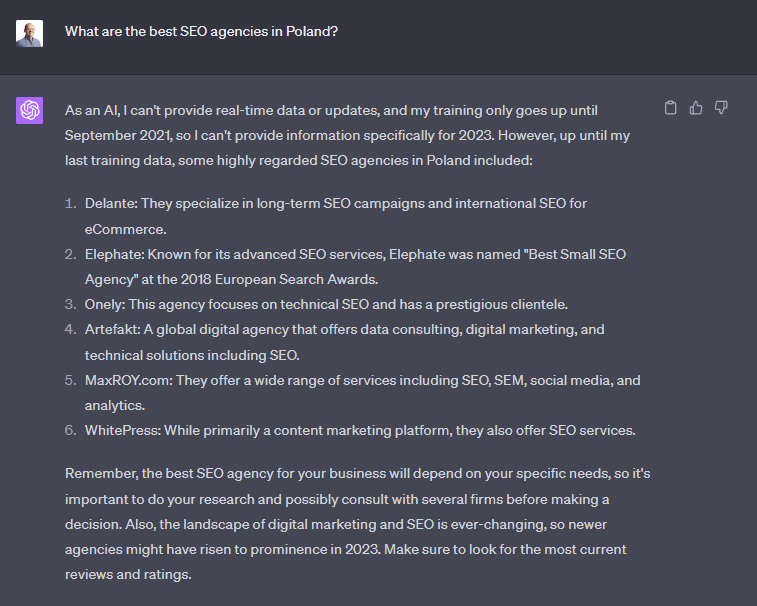Will ChatGPT replace the Google Search Engine?
Long story short: no, ChatGPT will not replace the Google Search Engine. It might take over some traffic but, at least for now, it’s unable to turn the search engine market upside down. And that’s because it’s hallucinating.

Table of contents
What is ChatGPT if it’s not a search engine?
ChatGPT has taken the digital sector by storm, conquering hearts and minds alike. And this has happened for a reason. It’s easy to use, free of charge, and full of potential uses. It’s powerful, but not unlimited. In fact, I often see how its powers are overestimated and put to use in ways it’s not able to perform.
One such undoable task is searching for information.
This may not matter to users who mostly look at the UI and the end result only. At this level, Google Search and ChatGPT do look similar. There’s a field where you enter your query, and then you receive some output: for Google, this is a list of websites (not only, though: in recent years, Google has started showing so-called rich results, which are meant to answer the user’s question at the search engine level); for ChatGPT, this is a full answer to a given question.
AI algorithms in Google Search
For the sake of clarity, let me emphasize this: Google vs ChatGPT is not simply about a competition between a classic search engine and AI. Google has used AI algorithms to respond to user queries for some time now (source). RankBrain, Neural Matching, Bert, MUM – these are the most popular AI algorithms that Google has introduced to its search engine in the past years.
BERT (Bidirectional Encoder Representations from Transformers) was launched in 2018 and it supports the search engine in processing and understanding natural language. It’s based on the Transformer architecture – just like the GPT model used by ChatGPT.
How does ChatGPT work?
ChatGPT is a probabilistic language model designed to follow and implement instructions. It has been trained on a specific set of textual data to perform the instructions as accurately as possible. It does so by generating tokens: sequences of characters and words, based on probability distribution.
To put it simply, what artificial intelligence basically does is analyze the statistics and sequentiality of word order and build strings of the most probable words (source). The aspect that is not yet visible in ChatGPT itself – but will be visible in its Bing iteration or the OpenAI Playground source model – is the possibility of defining the “temperature” parameter. This feature allows users to decide how much the model can deviate from the information it has learned from its dataset (source).
In practice, the temperature parameter tells you whether the tokens (words) used should have the highest probability level. This has an enormous impact on the final effect. If you decide to add only the most probable words, the output will be very flat, repetitive, and schematic. Once you allow the use of lower-ranking, more random tokens, you will get a more versatile and interesting output.
ChatGPT is not lying – it’s hallucinating
Obviously, AI’s responses get corrected in the process of fine-tuning, where the generated output is evaluated both by a human and by another, feedback-oriented model. As a result, the text generated by ChatGPT is more than a purely random patchwork of words – although sometimes it is just that. This randomness means that ChatGPT tends to hallucinate.
In other words, ChatGPT may generate an output which sounds plausible but has nothing to do with the facts.
For example, when asked about some scientific subject, it may cite particular research papers, along with their titles, authors, publication dates, etc.But once you start searching for these papers, it often turns out they have never existed. It all depends on how much information and how many citations on a given subject there were in the text corpus used for training the model.
Hallucinations happen because, even though the models are trained on huge amounts of textual data, they are not able to understand the world in a human way, or to verify the truthfulness of information like people would do. Instead, they rely on language structures and patterns learned from the training data.
Consequently, even if the output generated by a model is grammatically correct and sounds sensible, it may contain false information – or information “invented” by the model. This is where the concept of “hallucination” comes from.
And this is why you must bear in mind that although AI may be a powerful tool for text generation, it still requires human supervision and evaluation, especially if the information it provides is meant to be used for making important decisions or in situations where the use of precise and accurate data is essential. This is why using ChatGPT as an alternative to search engines – including Google – is practically out of the question.
Will ChatGPT replace search engines?
ChatGPT is not a search engine – it’s a text processor. As the name suggests, its function is to process text. It can generate texts as well, but to do that, it must receive some input or a pattern to follow. It won’t write a blog post for you (I mean, it can, but the writer must still fact-check the information generated by the chatbot).
What can we use ChatGPT for?
I use it myself: I do this in a specific and well-tested workflow, though. I start by providing a list of details that I want to be included in the text. This allows me to limit the potential hallucinations. When I collect this information, I fact-check it and do preliminary research – I can’t imagine replacing Google with ChatGPT in this respect. ChatGPT may come in handy for various uses: it can code, proofread, analyze and categorize content, and so on. But it won’t work as a search engine.
Will ChatGPT replace Google search? Google I/O 2023
As far as the competition between ChatGPT and Google is concerned, I need to draw your attention to the recent announcements from the Google I/O 2023 event. It turns out that the world’s most popular search engine is also going to present search results generated by artificial intelligence. And this is not about Bard, Google’s answer to ChatGPT, which, by the way, got a massive upgrade at the conference. It now works much better than the OpenAI product, because it’s able to analyze the content of particular URLs – and ChatGPT isn’t capable of doing that yet. OpenAI has already announced that a beta version of this feature will be released by mid-May for the paid plan subscribers. So far, ChatGPT can only hallucinate about website content, based on – most probably – the phrases in the URL. Bard can also respond to queries about current events, whereas ChatGPT makes it clear that its knowledge is limited up to 2021.
As we can learn from the announcements, the results generated by AI in Google Search will respond to long-tail queries. This means queries which are so specific that there are no relevant organic search results. It is not likely that AI-generated search results will respond to all, or even most queries. Generating such results costs 10 times more than a standard keyword search, even with additional elements.

The new, rather conspicuous box with the AI output, will affect CTRs, also for text ads. So, if Google covers too many keywords with AI boxes, in particular the keywords that are lucrative for advertisers, and, as a result, it blocks SERP-generated website traffic, advertisers will leave Google. It seems unlikely that Google will decide to kill off its main source of income.
What does this mean for businesses that rely heavily on SEO?
What does this all mean for businesses whose main source of income and lead generation is organic reach? Chatbots like ChatGPT and AI boxes visible in Google both work better in the case of strictly informational queries: questions which only have one correct answer. The users that are to be converted will have to look for their answers on the websites anyway, because it’s impossible to convert directly from the search engine result page. At least for now.
The difference may be visible in the user journey. AI boxes may take over the traffic from the content that was supposed to educate customers. Now, the question is – will it be possible to measure (for example, from the level of Google Search Console) how often given content is used by Google AI to generate the new type of results?
Let me give you an example, or a fun fact. When asked about the best SEO agencies in Poland, both ChatGPT and Google’s Bard give Delante as their top answer.


We’ve checked that multiple times in the last couple of months, using various devices and accounts which are not connected with the company. One or two clients, when asked how they’d found out about us, told us that they’d learned about us from ChatGPT.
A new term has already been coined by the SEO industry: AIO, that is – Artificial Intelligence Optimization. Our success in this area was a huge surprise to me (despite our strong engagement in SEO). My theory is that the key factors were off-site in this case. As many trusted domains mention us and link to us (e.g. our high-ranking Clutch profile) AI models consider us recommendable. This means that the key to AIO will be off-site SEO.
Is content still king?
So, what about website content creation, which has reigned over digital marketing in the past years? AI tools like ChatGPT can be used to create content in a cheaper and quicker way. However, this leads to content inflation. You will no longer build a competitive advantage just by having an extensive blog with thousands of substantial and specialized articles.
It seems that we are in a transition period where mass and automated website content generation still makes it possible to achieve better results. The more websites start doing this, though, the weaker outcomes the strategy will bring. The way users consume content is changing towards shorter and more condensed forms, both in terms of text and video (just take a look at TikTok or YouTube Reels) – and AI will only contribute to this trend.
It’s worth remembering here that AI models are able to create not only texts but also graphics, photos, music, and videos. Of course, texts are the easiest and cheapest to create but we should expect the entry threshold for creating multimedia content to also become lower.
So, although AI allows creating content in a cheap way, the key factor is going to be the unique, original, and factual qualities of this content. To ensure these qualities, you will need a human with unconventional ideas and a creative attitude. Artificial intelligence will be used to find inspiration and coordinate the creative process, so it will get relatively cheaper. At the same time, the expert will play a crucial role in the process by bringing true value to generative AI.
More AI tools
AI makes it possible to produce not only more and more content but also code and software scripts – that is, tools. Numerous startups have begun to spring up, claiming to offer better versions of ChatGPT, while in fact, they mostly want to go with the AI hype flow.
Two aspects are worth highlighting in this trend. Many tools, especially those created in Q4 2022 and Q1 2023, are based on the OpenAI API. So, they are based on the GPT model. However, to optimize costs, they are usually based on the older (and cheaper) models, which generate outputs of much lower quality. What follows is that instead of looking for go-betweens (like JasperAI), it’s a better idea to integrate the model independently through the API. After all, ChatGPT itself can help you write the necessary code.
On the other hand, as the recently leaked Google document suggests, the company fears that it will lose the AI technology race, not to OpenAI, but to smaller contestants. Open-source models trained on smaller but precisely curated datasets are cheaper and take less time to train. This way, they offer better flexibility.
“They are doing things with $100 and 13B params that we struggle with at $10M and 540B,” the note reads. It may be concluded that, instead of relying on ready-made solutions, you can start learning how to train your own AI models, for your own needs. According to the document leaked from Google, you only need one evening to do that.
Will ChatGPT replace the Google Search Engine? – Summary
Let’s sum it up – it’s very unlikely that ChatGPT will replace Google Search. From a technological perspective, they are two different tools. ChatGPT is not a search engine and it shouldn’t be treated as one. What’s more, Google – despite a momentary slowdown in Q1 2023 in terms of AI and language models – is not going to lose ground to OpenAI.
This discipline is growing so dynamically at the moment that it’s really hard to make any sensible predictions. What we know for sure is that there are two big players and a number of smaller entities working on AI who are able to react better and quicker to technological and business changes than the tech giants. For end users, this competitive environment may mean that there will be more and more high-quality and relatively accessible tools based on artificial intelligence. The only question that remains is – are we going to leverage their potential in the right way?
About the author: Wojciech is a SEO R&D Specialist at Delante, the SEO agency we work with. He has over five years of SEO experience with specializations in web analytics, technical SEO, legal industries, and news portal positioning. His expertise includes optimizing websites, analyzing data, and addressing the specific needs of legal industries. Wojciech excels in strategically positioning news portals to maximize visibility and engagement.
Disclaimer: The primary graphic design in this article was created with the assistance of the Midjourney app.
Share this article:











